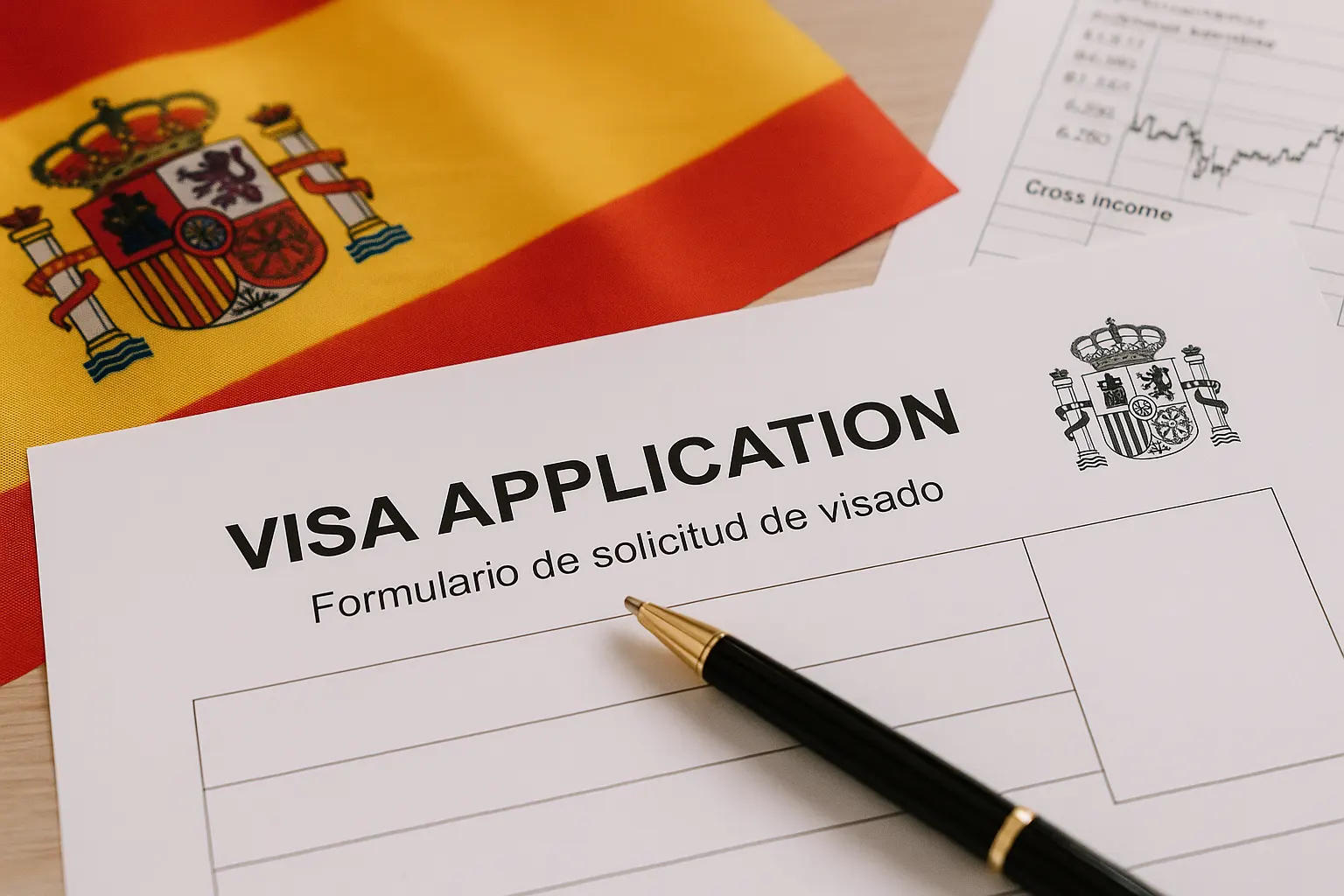The question “Can I live in Spain as a Canadian citizen?” has a straightforward answer: Yes, you can. Many Canadians choose to live in Spain for its rich culture, pleasant climate, and high quality of life. Becoming a Canadian living in Spain involves understanding the legal requirements and practical steps necessary to establish residency.
Living in Spain as a Canadian citizen requires compliance with immigration laws and obtaining the appropriate visa based on the length and purpose of your stay. Whether planning a short visit or aiming for long-term residency, Canada-Spain relations facilitate several visa options tailored to diverse needs such as remote work, investment, study, or retirement.
Key considerations include:
- Identifying the correct visa type for your intended stay
- Navigating the application process efficiently
- Complying with administrative obligations upon arrival
Detailed guidance ensures Canadians can transition smoothly into Spanish life without legal complications. This article provides a comprehensive roadmap covering visas, residency procedures, taxation, healthcare access, and integration tips designed specifically for Canadians eager to make Spain their new home.
Key Takeaways
- Canadians can live in Spain with the appropriate Canadian visa Spain tailored to the length and purpose of their stay.
- For short visits under 90 days, starting January 2024, an ETIAS authorization is mandatory for entry.
- Long-term residency options include the Non-Lucrative Visa, Digital Nomad Visa, Golden Visa, and Entrepreneur Visa, among others, each serving different needs and eligibility criteria.
- Applying for the NIE card upon arrival is crucial for legal recognition and to manage administrative tasks such as banking, taxation, and contracts.
- Successful integration requires awareness of Spain’s tax system, healthcare access rights, driving license regulations, and adjustment to local cultural norms essential for comfortable living.
These points serve as a practical roadmap for Canadians pursuing living in Spain and establishing their Spanish residency for Canadians.
Understanding Visa Requirements for Canadian Citizens
Short-Term Stay: ETIAS Authorization
Starting January 2024, the Spanish visa for Canadians will have a new requirement for short visits lasting less than 90 days. This requirement is called the ETIAS travel authorization (European Travel Information and Authorization System). ETIAS is designed to improve security in the Schengen Area by screening travelers before they arrive, instead of using a traditional visa.
Purpose of ETIAS
ETIAS has several important goals:
- Assessment of Travelers: Authorities can evaluate travelers before they reach Spain or other Schengen countries.
- Risk Identification: ETIAS helps identify potential security threats or irregular migration issues.
- Streamlined Border Control: By pre-validating entry eligibility, border control procedures become simpler and more efficient.
How to Apply for ETIAS
The application process for ETIAS is fully online and straightforward. Here are the steps involved:
- Fill out the online application form with your personal information and travel details.
- Answer any security-related questions honestly and accurately.
- Ensure that you have a valid Canadian passport at the time of application.
- Make a payment for the small processing fee associated with your application.
Validity Period of ETIAS
Once your ETIAS authorization is approved, it will remain valid for three years or until your passport expires, whichever comes first. During this validity period, you can make multiple entries into Spain and other Schengen countries without needing to reapply each time.
Rights and Restrictions Under ETIAS
With ETIAS, you are allowed to travel to Spain and the entire Schengen Area for up to 90 days within any 180-day period. However, it’s important to note that ETIAS does not grant permission for long-term residence, employment, or studies. If you have plans for those purposes, you will need to apply for separate visa types.
When you arrive at the border, it is crucial to comply with all regulations set by border control officers. Remember that final admission into the country is ultimately at their discretion.
Canadians planning short tourism trips, family visits, or business meetings will find ETIAS simplifies entry while maintaining compliance with European security standards. Questions like “Can I live in Spain as a Canadian citizen?” arise frequently but require understanding distinct visa categories beyond ETIAS for extended stays or work purposes.
Long-Term Stay: Visa Options Explained
Canadian citizens planning to live in Spain for longer than 90 days must obtain the appropriate Spanish visa for Canadians. The distinction between short-term and long-term stays is crucial: while short visits under 90 days require only the ETIAS travel authorization starting January 2024, any extended stay mandates a visa application submitted through the Spanish consulate or embassy in Canada.
Several visa types Spain offers cater to different purposes and situations:
1. Non-Lucrative Residence Visa
This visa suits Canadians who wish to reside in Spain without engaging in local employment. Eligibility requires proof of sufficient financial means and private health insurance. Remote work for foreign employers is permitted but working within Spain’s labor market is prohibited. The initial visa duration is typically one year, renewable thereafter.
2. Digital Nomad Visa
Tailored for remote workers employed by companies outside Spain, this visa enables Canadians to legally live and work remotely from Spain. Applicants must demonstrate stable income from abroad and health insurance coverage. Benefits include residence rights and simplified procedures compared to traditional work visas.
3. Golden Visa
Designed for investors, this visa requires a minimum investment of €1,000,000 in Spanish qualifying assets. It grants residency rights not only in Spain but also facilitates free movement within the Schengen Area. The Golden Visa is attractive for those seeking both legal residence and investment opportunities.
4. Entrepreneur Visa
Intended for Canadians aiming to start innovative businesses in Spain, applicants must present a viable business plan that contributes economically or socially. Approval hinges on the project’s potential impact and job creation capacity.
5. Other Visa Categories
- Highly Qualified Workers: For professionals with specialized skills meeting salary thresholds.
- Researchers: For academics conducting research projects in Spain.
- Self-Employment: For freelancers or independent professionals intending to operate businesses locally.
- Study Visas: For students enrolled in recognized Spanish educational institutions.
Each visa type involves specific requirements, application procedures, and rights upon approval. Careful consideration of personal circumstances ensures selecting the most suitable option for Canadian citizens seeking residence in Spain beyond short-term tourism or business trips.
Navigating the Residency Process After Arrival
Securing the NIE card Spain is a fundamental step for Canadian citizens once they arrive. The NIE (Número de Identificación de Extranjero) serves as an identification number essential for numerous legal and administrative procedures such as opening a bank account, signing rental contracts, or starting employment.
Applying for TIE or NIE Number
The type of visa held determines the exact process:
- TIE (Tarjeta de Identidad de Extranjero): This Foreigner Identity Card is mandatory for those with long-term residence permits. It contains the NIE number and personal data, acting as proof of legal residency.
- NIE Number Only: Canadians on short stays or certain visa types may only need the NIE number without a physical card.
Steps to apply:
- Schedule an appointment at the local Foreigner’s Office (Oficina de Extranjería) or police station.
- Complete the application form corresponding to your visa category.
- Submit required documents including passport, visa, proof of address in Spain, and appointment confirmation.
- Pay the applicable fee and collect your TIE card or receive documentation confirming your NIE number.
Residency Registration (Empadronamiento)
Registration at the local town hall through empadronamiento is legally required within a few weeks of arrival. This registration:
- Confirms your place of residence in Spain.
- Is necessary for accessing public services such as healthcare and education.
- Supports applications for other permits and social benefits.
The empadronamiento certificate also acts as official proof of residence, which is often requested during bureaucratic procedures.
Obtaining these documents promptly ensures compliance with Spanish immigration regulations and facilitates everyday life activities in Spain.
Legal and Administrative Considerations for Canadian Residents
Taxation Obligations
Living in Spain as a Canadian citizen introduces important tax considerations that require careful attention. Understanding tax obligations Canada Spain is critical to avoid issues related to dual taxation and compliance with both countries’ regulations.
1. Spanish Tax Residency Rules
Spanish tax law considers an individual a tax resident if they spend more than 183 days in Spain during a calendar year or if their economic interests are primarily based in Spain. Once classified as a tax resident, worldwide income becomes subject to Spanish taxation.
2. Canadian Tax Responsibilities
Canada taxes its residents on worldwide income. However, if you become a Spanish tax resident, Canadian tax obligations may change depending on residency status under Canadian law.
3. Dual Taxation Canada-Spain
Bilateral agreements between Canada and Spain are designed to prevent double taxation. The Canada-Spain Double Taxation Treaty allocates taxing rights and provides mechanisms such as foreign tax credits to reduce the burden of paying taxes in both jurisdictions on the same income.
4. Consulting Tax Advisors
Navigating these complexities demands professional guidance. Experts like those at NIM Immigration Lawyers offer specialized advice on tax obligations Canada Spain. They ensure compliance with Spanish tax residency rules while optimizing tax liabilities and leveraging treaty benefits effectively.
5. Practical Steps for Canadian Expats
- Determine your residency status for each country early after relocation.
- Maintain thorough documentation of days spent in each country and source of income.
- File required tax returns timely in both jurisdictions to avoid penalties.
- Consider implications of assets held abroad and reporting requirements under Spanish law.
Paying close attention to taxation matters safeguards your financial interests and legal standing during your stay in Spain. Aligning with qualified advisors prevents costly mistakes related to dual taxation Canada-Spain scenarios, easing your transition into life abroad.
Healthcare Access
Understanding healthcare access Spain expats is crucial for Canadians planning to live in Spain. Eligibility for Spanish public healthcare primarily depends on contributions to the Spanish social security system. Canadian citizens working or self-employed in Spain and registered with the social security system gain access to public healthcare services under the same conditions as Spanish nationals.
Private Health Insurance Requirements
Private health insurance becomes mandatory for certain visa types, particularly the Non-Lucrative Visa, which requires proof of comprehensive private health coverage without co-payments or deductibles. This insurance must cover all risks in Spain during the entire stay period. The Digital Nomad Visa may also require private health insurance, depending on specific application conditions.
Importance of Compliance
Navigating these requirements ensures compliance with visa rules and avoids complications related to tax obligations Canada Spain and dual taxation Canada-Spain. Consulting specialists familiar with Spanish tax residency rules and healthcare regulations helps secure proper coverage and legal standing while residing in Spain.
Driving License Regulations
Canadian driving licenses remain valid for the first six months after arriving in Spain, allowing new residents to drive without immediate exchange. After this period, obtaining a Spanish driving license is mandatory to comply with local regulations.
Key steps in the Spanish driving license exchange process:
- Submit an application at the local Traffic Department (DGT).
- Provide original Canadian driving license and a certified translation if not in Spanish.
- Present proof of residency in Spain (NIE card or registration certificate).
- Pass a medical examination at an authorized center confirming physical and mental fitness.
- Pay the corresponding fees required for the exchange procedure.
Canada and Spain have reciprocal agreements facilitating license exchanges without requiring additional practical or theoretical exams, streamlining the process for Canadian expats.
Understanding these requirements complements awareness of tax obligations Canada Spain and healthcare access Spain expats must consider when relocating. The question Can I live in Spain as a Canadian citizen? involves multiple legal and administrative facets including compliance with driving license rules that support seamless integration.
Living Comfortably as a Canadian Expat in Spain
Cost of Living Comparison
The decision to move abroad involves careful consideration of living expenses. Comparing the cost of living Spain vs Canada reveals significant differences that often favor Spain, particularly for Canadian expats seeking affordable living options.
1. Housing
Rent and property prices in Spain are generally lower than in major Canadian cities like Toronto or Vancouver. For example, renting a one-bedroom apartment in Madrid or Barcelona can cost between €700 and €1,200 per month, whereas similar accommodations in Canadian urban centers may exceed CAD 1,500 monthly.
2. Utilities and Services
Basic utilities such as electricity, heating, cooling, water, and garbage collection average around €100–€150 monthly in Spain. Internet services typically cost about €30–€50 per month. These expenses tend to be lower than comparable costs in Canada.
3. Groceries and Dining
Food prices in Spain benefit from local production and Mediterranean diet staples. Weekly grocery bills for a single person usually range between €30 and €50. Dining out is affordable; a three-course meal at an inexpensive restaurant averages €12–€15. In contrast, Canadian grocery costs are higher on average due to import reliance and supply chain factors.
4. Transportation
Public transport systems across Spanish cities are efficient and economical. Monthly passes for buses, trams, and metros cost between €40 and €60 depending on location. Owning and maintaining a car may be less expensive due to lower fuel prices compared to Canada.
5. Healthcare Costs
Public healthcare access is either free or low-cost for residents with social security coverage. Private health insurance premiums vary but remain competitive compared with Canadian private plans.
Lower costs contribute substantially to making Spain an attractive destination for Canadians seeking financial ease without sacrificing quality of life.
Popular Cities Among Canadian Expats
Several Spanish cities have developed reputations as welcoming hubs for expatriates from Canada due to their amenities, climate, infrastructure, and cultural richness.
- Barcelona: Known for its vibrant cultural scene, cosmopolitan lifestyle, and Mediterranean beaches. Offers extensive international services suitable for expatriates.
- Madrid: The capital city combines rich history with modern conveniences, ideal for career opportunities alongside leisure activities.
- Valencia: Praised for its balanced urban life and affordability compared to larger cities; excellent climate year-round.
- Malaga: Popular among retirees and digital nomads alike for its mild winters and growing international community.
- Alicante: Coastal city favored for relaxed living with access to beaches and natural parks at relatively low cost.
Canadian expats often select these cities based on personal preferences regarding climate, job markets, language environments, and social networks.
Cultural Adaptation Tips
Adapting to life in Spain requires more than logistical preparation; understanding cultural nuances enhances integration significantly:
- Embrace the siesta tradition while noting that business hours may differ from Canadian norms.
- Learn basic Spanish phrases to facilitate daily interactions; many regions also use Catalan or other local languages.
- Participate in local festivals and community events to build connections.
- Adjust expectations around punctuality—Spanish social settings tend toward flexible timing.
- Appreciate the importance of family-oriented lifestyles common throughout Spain.
These adjustments foster smoother transitions into Spanish society while enriching the expat experience considerably.
Popular Cities Among Canadian Expats
When considering the question Can I live in Spain as a Canadian citizen?, selecting the right city is crucial for both lifestyle and practical integration. The best cities for expats in Spain offer a blend of affordability, cultural richness, and established communities.
1. Madrid
Madrid attracts many Canadian expats due to its vibrant economy, extensive amenities, and active social scene. The city’s international character supports smoother cultural integration Spain for newcomers. While the cost of living Spain vs Canada remains generally lower, Madrid is slightly more expensive than other Spanish cities but offers excellent opportunities for work and recreation. The Madrid expats Canada community is growing, providing a valuable network for support and socializing.
2. Barcelona
Known for its unique architecture and Mediterranean lifestyle, Barcelona hosts one of the largest Barcelona expat community Canada. Its cosmopolitan atmosphere helps Canadians adapt quickly to new surroundings. Affordable living Spain Canadians find attractive here includes lower housing costs compared to major Canadian cities. Access to beaches, cultural festivals, and international schools adds to its appeal.
3. Valencia and Malaga
For those prioritizing affordable living Spain Canadians, Valencia and Malaga stand out with lower daily expenses and pleasant climates. These cities have increasingly popular expat neighborhoods where newcomers can join local events and connect with fellow Canadians.
Choosing among these options depends on personal preferences related to climate, job opportunities, and lifestyle expectations. Each city supports different facets of living abroad, from bustling urban life to relaxed coastal environments. This diversity allows Canadian citizens to find a suitable Spanish home matching their needs perfectly.
Cultural Adaptation Tips
Adapting to life in Spain involves more than understanding the cost of living Spain vs Canada; it requires embracing the local culture and lifestyle. Canadians moving to Spain benefit from immersing themselves in the social fabric, which enhances both personal satisfaction and practical day-to-day interactions.
Key elements for successful cultural integration in Spain include:
- Learning Spanish culture: Understanding local customs, social etiquette, and community values facilitates smoother relationships with neighbors, colleagues, and service providers.
- Language importance integration: While many Spaniards speak English in tourist areas, proficiency in Spanish significantly improves communication, opens doors to new opportunities, and fosters a sense of belonging.
- Participating in community events: Engaging with festivals, markets, and neighborhood gatherings promotes connections and provides authentic experiences beyond tourist perspectives.
- Respecting local schedules: Spaniards often dine later and observe siesta hours; adapting to these rhythms helps avoid frustration and aligns daily routines with societal norms.
- Building a support network: Joining expat groups or language exchange meetups offers emotional support and practical advice on navigating challenges unique to newcomers.
Choosing among the best cities for expats in Spain, Canadians can find diverse environments that cater to different preferences—whether seeking vibrant urban life or tranquil coastal settings with affordable living Spain Canadians appreciate.
Embracing these cultural adaptation strategies turns relocation from a logistical challenge into an enriching experience deeply connected to Spanish life.
How NIM Immigration Lawyers Support Canadian Citizens Moving to Spain
NIM Immigration Lawyers specialize in providing online immigration advice Spain Canadians can rely on. Their services focus on simplifying the complex visa application processes, offering expert guidance tailored to individual circumstances. Canadians seeking to live in Spain benefit from NIM’s comprehensive support, especially when applying for specialized visas such as the Digital Nomad Visa.
Key features of NIM Immigration Lawyers’ support include:
- Fully digital consultation and case management: Clients communicate directly with immigration experts through an online platform that streamlines documentation and legal procedures without in-person meetings.
- Expertise in diverse visa categories: From non-lucrative residence to entrepreneur and golden visas, NIM provides detailed guidance customized to each client’s goals.
- Personalized case analysis: Each application is carefully reviewed to identify the best legal pathways, increasing approval chances while ensuring compliance with Spanish regulations.
- Tax advisory services: Understanding tax obligations is crucial for long-term residents; NIM offers specialized advice to prevent double taxation and optimize financial planning.
- Dedicated team with multilingual support: Led by experienced lawyers familiar with Canadian-Spanish immigration nuances, ensuring clear communication and trustworthy assistance.
The firm’s client-centered approach combines cutting-edge technology with legal expertise, making it a preferred partner for Canadians pursuing residency or work opportunities in Spain.
Conclusion
As a Canadian citizen, you can live in Spain if you plan ahead and understand the legal requirements. By taking the right steps, you can confidently answer the question, Can I live in Spain as a Canadian citizen?
Here are some important things to keep in mind:
- Moving to Spain checklist Canadians should follow, focusing on visa selection based on duration and purpose of stay.
- Residency planning tips such as applying for the NIE card promptly after arrival and registering at the local town hall (empadronamiento) to comply with Spanish laws.
- Being aware of tax implications and healthcare access ensures smooth integration into Spanish society.
- Understanding driving license regulations helps maintain mobility without disruption.
- Adapting to the culture enhances the overall expat experience, making daily life more comfortable.
By following these guidelines carefully, you can reduce the risk of problems and make your transition smoother. Seeking help from experts like NIM Immigration Lawyers can provide personalized support tailored to your specific situation. This will empower you as a Canadian citizen to navigate complex immigration systems confidently and efficiently.
With knowledge, careful planning, and professional guidance, establishing residency in Spain becomes clearer and more achievable.
FAQs (Frequently Asked Questions)
Can Canadian citizens live in Spain and what are the visa requirements?
Yes, Canadian citizens can live in Spain by obtaining appropriate visas depending on the length and purpose of their stay. Short stays under 90 days require ETIAS travel authorization starting January 2024, while long-term options include Non-Lucrative Visa, Digital Nomad Visa, Golden Visa, Entrepreneur Visa, among others.
What are the tax and healthcare obligations for Canadians living in Spain?
Canadian residents in Spain should understand their tax responsibilities in both countries to avoid double taxation, often requiring consultation with tax advisors like NIM Immigration Lawyers. Eligibility for Spanish public healthcare depends on social security contributions; some visas require private health insurance coverage.
What legal steps must Canadian residents take after arriving in Spain?
After arrival, Canadians must apply for the NIE number or Foreigner Identity Card (TIE) depending on their visa type. Registration at the local town hall (empadronamiento) is also a legal requirement to establish residency and access public services.
What are the main long-term visa options for Canadians wishing to reside in Spain?
Long-term visa options for Canadians include the Non-Lucrative Residence Visa (allowing remote work but no local employment), Digital Nomad Visa (for remote workers employed abroad), Golden Visa (requiring a minimum €1,000,000 investment with Schengen mobility benefits), Entrepreneur Visa (for business startups), as well as visas for highly qualified workers, researchers, self-employed individuals, and students.
What is the ETIAS travel authorization and who needs it?
ETIAS (European Travel Information and Authorization System) is a mandatory travel authorization for Canadian citizens visiting Spain for short stays under 90 days starting January 2024. It involves an online application process that grants validity for multiple visits within its period but does not permit long-term residency or work.
How do driving license regulations affect Canadian expats in Spain?
Canadian driving licenses are valid for the first six months after arrival in Spain. After this period, expats must follow the process to exchange their Canadian license for a Spanish driving license according to local regulations to continue driving legally.














